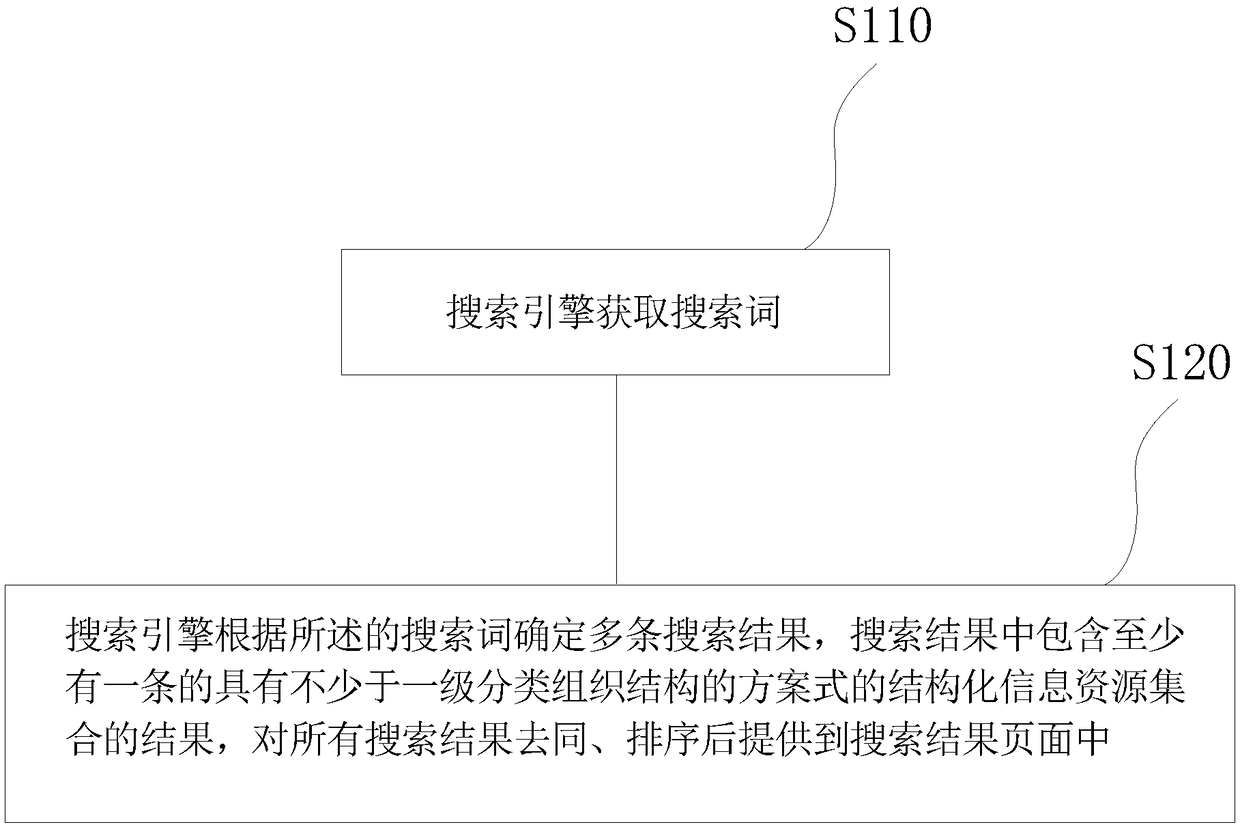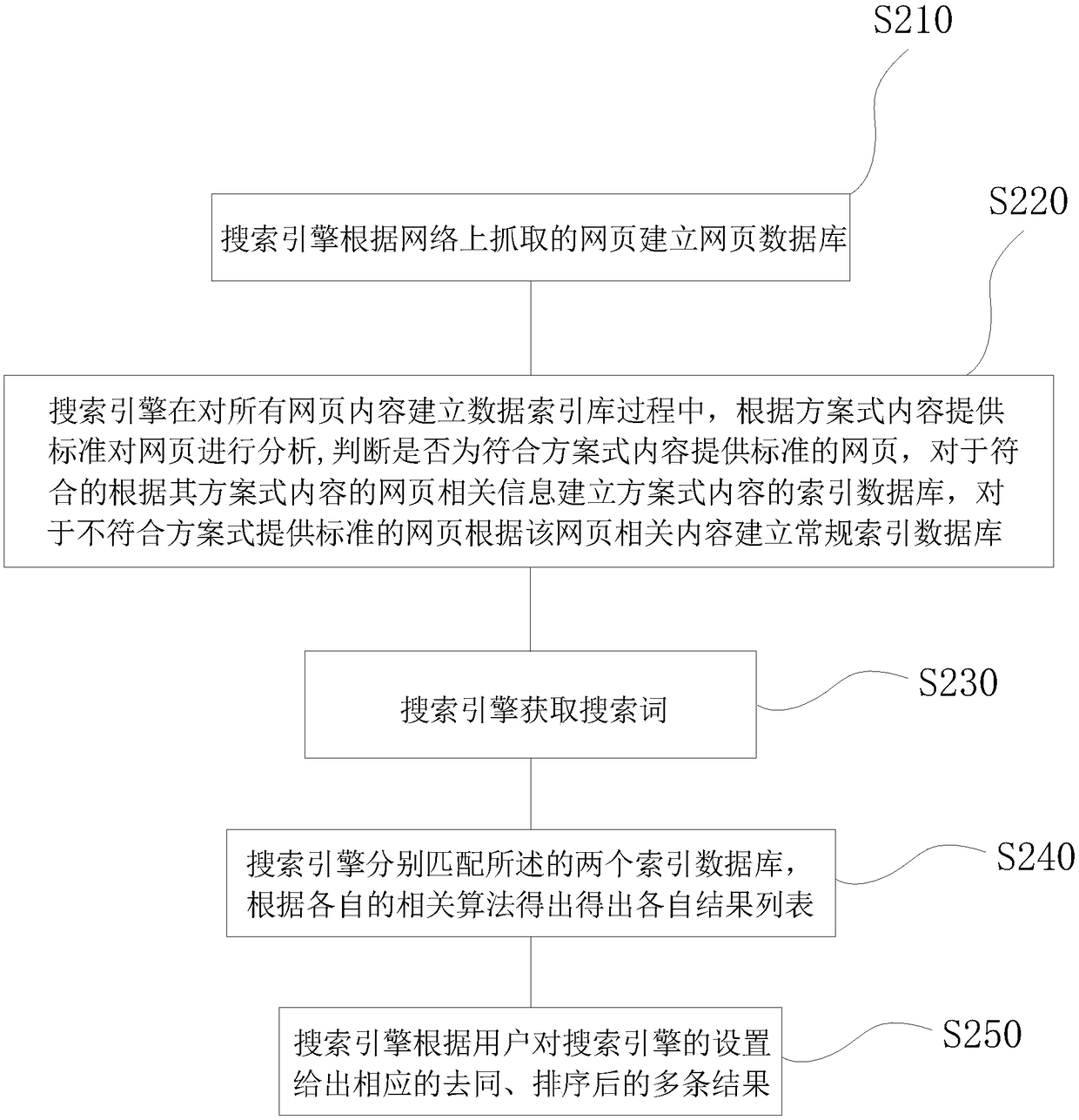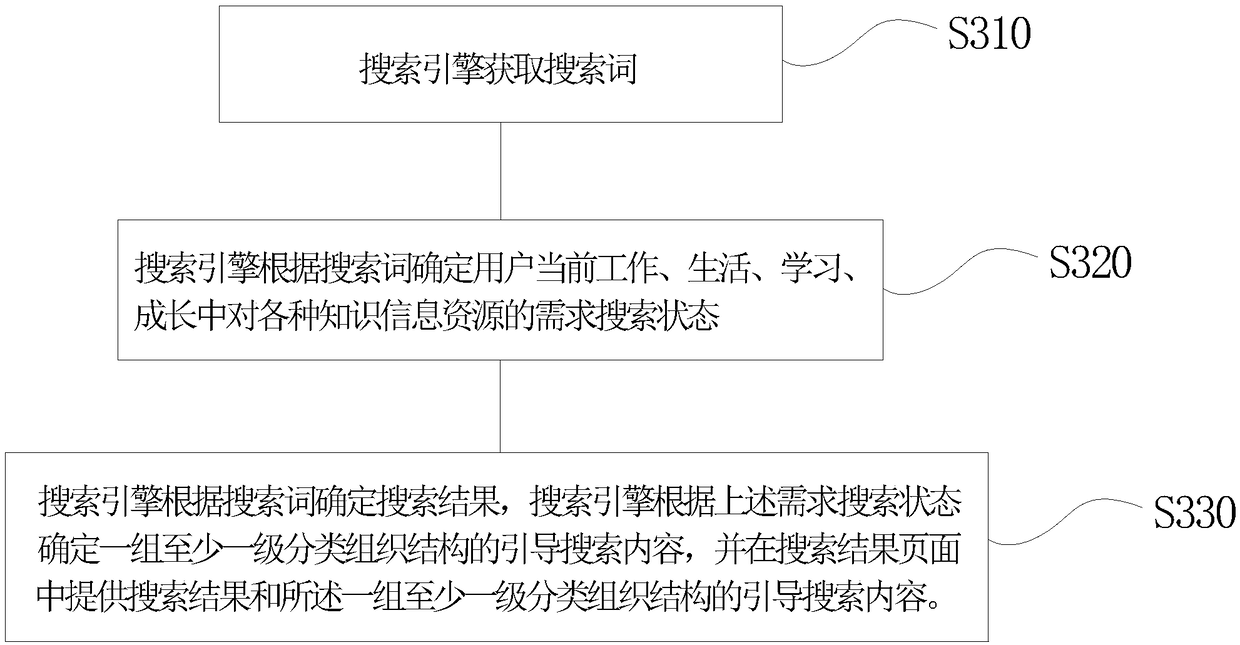[0004] (1) Each result corresponds to a
web page that provides too few targeted information resources. When a user searches for a relatively broad content, the
search engine gives results containing
search terms, and the results correspond to The content of the webpage is all about an article or a specific content for the title of the webpage, so that users cannot obtain multiple webpages corresponding to multiple articles from one webpage corresponding to one result to meet users’ needs for this broad content from multiple perspectives. Information resources cannot provide users with a
directory index page tailored to
user needs. This
directory index page contains multiple webpage links corresponding to multiple contents required by users. Today's search engines can provide tens of millions of results. Users will only browse the first ten or twenty results, and there is only a relationship between the webpages corresponding to the first ten or twenty results that contain
search terms, rather than complementing each other from multiple perspectives. The relationship of providing the best results, so the first ten or twenty results cannot meet the user's needs for optimal, systematic, and comprehensive results. At this time, users will no longer browse the first ten or twenty results. , or search again, or turn around and leave, which is very bad for user experience
[0005] (2) The resource structure provided by a
web page corresponding to each result is single. When a user searches for a very broad content, the
search engine gives a result containing the search word, and the content of the web page corresponding to each result They are all aimed at an article or a specific content of the title of the webpage. For this broad search, users need many information resources, and these many information resources correspond to many webpages. Obviously, the current search engines cannot combine these information resources. The corresponding webpages are classified into categories and the
classified information and corresponding resource webpages are provided to users through the webpage corresponding to one of the results. Of course, existing search engines can search tens of millions of articles containing all Multiple results are required, but the webpages corresponding to these multiple results are irregular and organized in terms of content relevance, and users cannot quickly find the desired results
[0006] (3) A web page corresponding to each result provides a
single type of resource. When a user searches for a broad content, the user may need not only relevant knowledge and experience but also related
software and other types of resources. Usually, the engine can only provide us with results containing the
search terms entered by the user. Obviously, it cannot provide users with various types of files in the web page corresponding to one result at a time. For example, the user enters "
java learning" to search, Figure 8 It is an example diagram of a search result about the search term "
java learning" provided by a search engine in the related art. Although the related search engine does not provide the content of multiple types of information resources through one result, it provides users with many results. All kinds of content, but it is difficult for users to find important content such as learning tutorials, learning videos, and
software used in learning in the process of learning
Java, although users can click on the search engine to provide The recommended word "
java learning video" in the relevant search recommendation content is searched again, but this re-search may not be able to find a learning video that can be used at one time. After multiple searches to obtain the desired "java learning video", I want to search learning tutorial”, the user has to search again, so although the existing
search engine technology can search for various types of resources that the
user needs, it will waste a lot of time for the user to search from a large number of results, and it cannot effectively improve the user’s performance. search efficiency
[0007] (4) Matching search terms cannot provide specific content under the category of search terms
When a user searches for a broad content, the existing search engine can only provide the user with results containing the search terms entered by the user, but cannot provide the user with relevant results corresponding to the following specific categories of the broad content, such as When the user enters "
engineering subcontract" to search, the search engine provides the user with results containing the search term "
engineering subcontract", but cannot provide the user with "
engineering subcontract" corresponding to the following such as "civil construction contract" ", "Reinforcement Work Contract", "
Carpentry Contract", these specific classifications correspond to the content results
[0008] (5) Matching search terms cannot provide the pre-requirements and related content corresponding to the search terms. The current matching mechanism of the search engine can only provide users with results containing the search terms entered by the user, and cannot provide the corresponding pre-requirements and associated content at one time. related content
For example, when a user enters "how to install win7
operating system" to search, the search engine can give various results on how to install win7
operating system but will not provide "how to set
BIOS" together, but the user needs relevant knowledge on "how to set
BIOS". , because the user cannot learn to set the
BIOS if he does not know how to set the BIOS. At this time, the user can only search "how to set the BIOS" again, which cannot provide a better experience for the user
[0009] (6) Provide solutions to problems instead of specific content. When users search for a broad content, the search engine usually provides the website to the user. The user searches through this website to obtain search results step by step, and cannot give multiple specific contents at one time. , For example, if a user enters "Internet search patent download" and wants to obtain multiple search patents, existing search engines will not immediately provide multiple patents related to Internet search technology (such as multiple patents classified by company name), but provide A search site allows users to search by themselves, and cannot provide users with the most efficient search
[0012] 1) When a user wants to know a more specific content (such as a video, an article, etc.), and wants to know more about the knowledge, experience or
resource information related to the content in a systematic and comprehensive way, search engines usually provide The recommended content based on the expansion of the search term is about the popular and high-frequency recommended search terms concerned by the user, which cannot reflect the completeness, relevance, and category of the
knowledge resource. Organizational
system, the existing search engines cannot provide recommended content that can meet the needs of users. In this case, users can only construct search terms to search again to obtain more comprehensive
knowledge resource information, and cannot provide users with more efficient, intelligent, Facilitated Search
[0013] 2) When a user wants to know more systematic and comprehensive results related to a relatively broad content, such as the comprehensive content of "
Java Learning" and the picture content of "
Wallpaper", the user needs to understand the knowledge and experience classification
system or resources of the broad content According to the classification of the broad content, the
search words of its classification are constructed again and again, and then the
search words are input again and again to obtain the search results that the user wants. This method is very inefficient and the user experience is very poor.
[0014] Up to now, there is still no better technical release on classification intelligence to guide users to search. Baidu Online Network Technology Co., Ltd. proposed a guided search method in the "Search Method and
Search Engine". First, this method cannot pass the search The word identifies the current
knowledge resource information demand status of the user in the process of work, life, growth, and learning, and then gives the guidance content of the classification and organization structure of the knowledge experience
resource information under the demand status; for example, the user enters the search term "java
Environment variable setting", the search engine analyzes that the user is learning java, and gives the relevant
knowledge classification of java learning to guide the user to search, while Baidu Online Network Technology Co., Ltd. proposes that when the user enters "java learning", it will give java Learning-related guided search content such as "java learning videos", "java learning materials" and other demand dimensions cannot realize micro-knowledge. The details of user search terms can provide users with more knowledge in life, work, study, and growth in the future. Classification and guidance content of experience information resources
 Login to View More
Login to View More  Login to View More
Login to View More 


